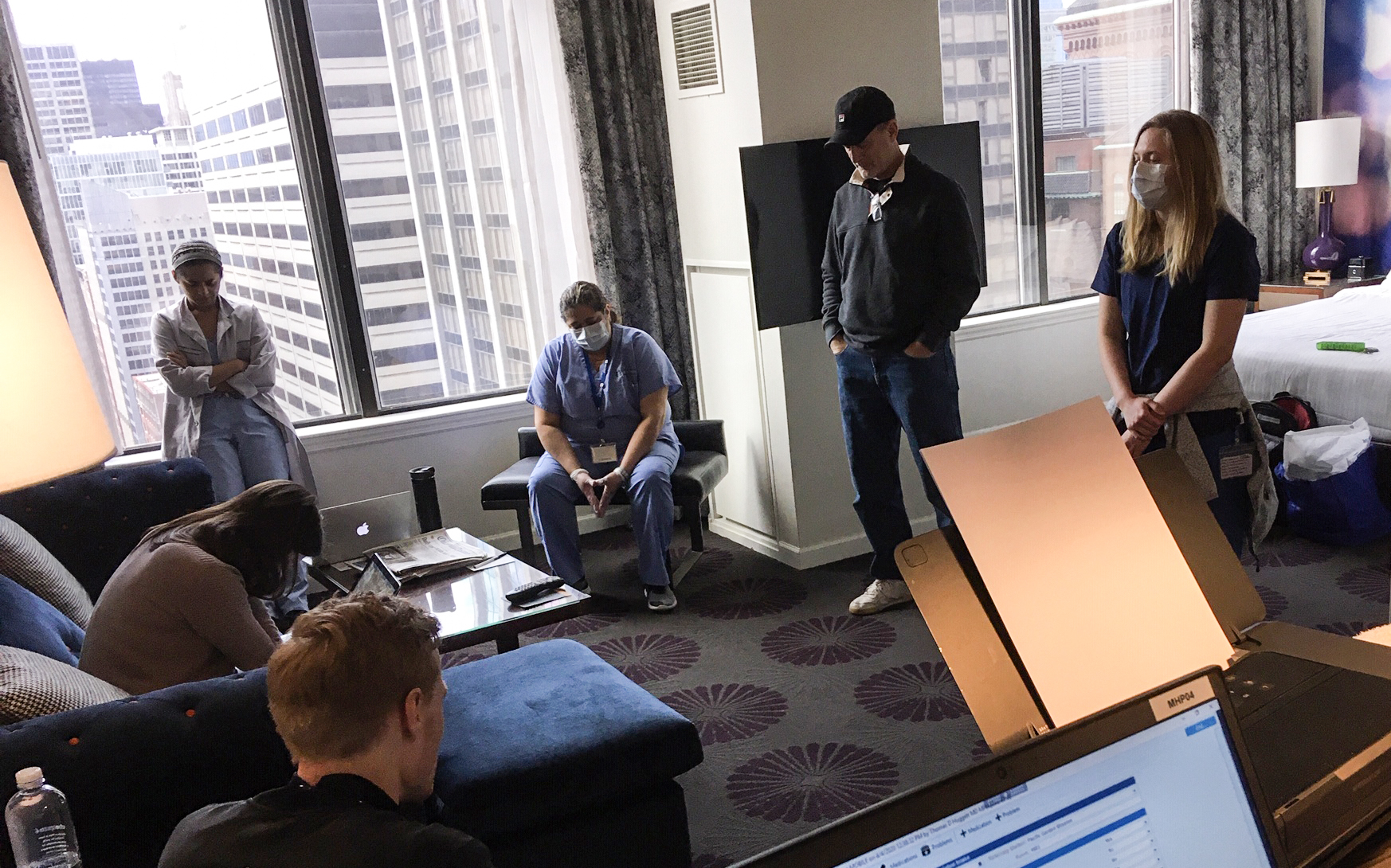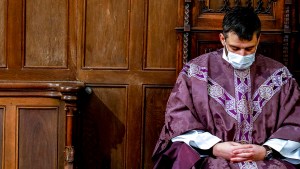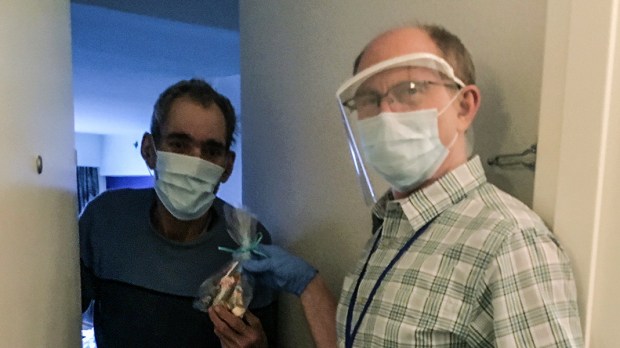When the COVID-19 pandemic began, some of the people at greatest risk were those experiencing homelessness. Dr. Thomas Huggett, a family medicine specialist in Chicago, has spent years caring for at-risk people. When the virus reached Chicago, he and his colleagues at Lawndale Christian Health Center knew they had to do something to protect these vulnerable people.
Their solution? Working with the City of Chicago to rent hundreds of rooms in two downtown hotels to create a makeshift isolation facility for the homeless.
“I’ve worked for decades with people experiencing homelessness, and during this time, we are sheltering folks that don’t have a home to protect them from coronavirus,” Huggett said in an interview with Aleteia. He explained some of the reasoning behind the decision:
To keep safe right now, people are practicing social distancing and staying at home. But people who are experiencing homelessness don’t have a home where they can shelter in place. Many are staying in very large shelter settings, what we call congregate settings, with 200-300 people staying in one room. This can be a very dangerous situation for a virus to spread. It can be similar to a nursing home, with lots of people in one space. We were afraid the virus might spread quickly in this setting, and on top of that, a lot of the people staying in these settings are medically high-risk: They’re over 55 or over 60, they may have diabetes or heart problems or have other health concerns. That means they’re at a higher risk of dying, so we felt our role was to protect and shield those high-risk folks experiencing homelessness.
Huggett is the lead doctor in the program and has moved into one of the hotels to provide around-the-clock medical care for the guests in the program. “I stay here most nights,” he said, “but I do go home once a week to do laundry, pick up mail, and check on my roses.”
Huggett’s work living with and caring for at-risk homeless people is extraordinary, but for him, it’s not something new; rather it’s a continuation of decades of work with a like-minded team. Huggett is part of an organization that, to put it plainly, has been doing God’s work on Chicago’s West and South Sides since the 1980s. The organization’s website reads,
The mission of Lawndale Christian Health Center is to show and share the love of Jesus by promoting wellness and providing quality, affordable healthcare for Lawndale and the neighboring communities.
Indeed, the organization’s medical providers care for the health in mind, body, and spirit of their patients. Their work is greatly needed, and it’s no wonder the City of Chicago turned to Lawndale Christian Health Center for leadership in caring for homeless people during this health crisis.
Huggett is not the only health care provider who stays at the converted hotel, as other providers take turns staying overnight. “I help out with continuity with our providers. The operations staff and another provider also stay overnight,” he said. “On any given day we have about 35 people working here at the hotel. Just to arrange meals is quite an operation, taking them up and down the elevators, and 10 medical providers are here every day visiting guests in their rooms.”
At the hotels, each guest has his or her own room with a bathroom and shower. Each has 3 meals delivered to their room each day and sees a medical provider every day.
The converted hotels have sheltered 240 people so far, with the number of guests at 163 on the day I spoke to Huggett. “We are working with 20 shelters throughout Chicago, and we go regularly to identify high-risk people and arrange their transportation to the hotel.”
All of this work is consistent with Lawndale Christian Health Center’s mission to care for the poor with the love of Christ. For Huggett, in particular, his Catholic faith inspires and encourages him in his mission.

“We can be inspired by people like Mother Teresa,” he said, “and others who have really extended themselves working for the poor. We can look to the saints as examples.”
At times Huggett has felt worried or anxious, but he has found encouragement in reading the works of Fr. Walter Ciszek, a priest who spent decades in confinement and hard labor in the Soviet Union between 1939 and 1963, and writings of other holy men and women.
“Everyone is different, and we can’t all be Mother Teresa or Fr. Walter Ciszek,” Huggett said. “But we can answer what God is calling us to do.”
For Huggett, that call involves committed and self-sacrificial work to help “the least of these brothers and sisters” (Matthew 25:40). While the converted hotels are a temporary response to the pandemic, he and his team are working to make a lasting, positive impact in the lives of their patients:
We are not only trying to shield folks from coronavirus and save lives, but work towards getting them permanent housing. We don’t want them to leave the hotel and go back to shelters. It’ll be much safer for them to be in their own apartments, especially if the virus comes back in the fall, as many are predicting. Some of our guests will need help to live on their own, so there needs to be a structure in place, and this is a moment in time when we can work toward making that a reality.
Above all, Huggett hopes that his experience living and working among people experiencing homelessness can shine a light on the reality of that situation.
“There are a lot of misconceptions about people experiencing homelessness,” he said. “I’ve had people ask me if the hotel rooms are going to be torn up by the homeless. But the answer is no, not at all. They’re not only keeping their rooms neat and tidy, but some have asked me to get them cleaning supplies, so they can keep their space clean.”
He shared how Mother’s Day was difficult for many guests at the hotel, who miss their family, friends, and loved ones. Like anyone else, his patients want to be healthy, live in a place that’s safe, and have positive relationships with the people they care about.
“Folks experiencing homelessness are just regular folks, trying to do the right thing, and they are made in the image of God like we all are,” Huggett said. “If people could come to the hotel and talk to some of the folks here, they would hear stories about why someone might find themselves homeless.”
Huggett and the Lawndale Christian Health Center team are protecting the most vulnerable among us by providing housing for at-risk people in the midst of a global crisis, and hopefully this extraordinary situation can be a springboard to helping people not just during the pandemic but for the rest of their lives.
“There can be a stigma against people experiencing homelessness, but they are people, and they deserve respect and a voice and a proper place to stay,” Huggett said.

Read more:
The pandemic seen through the eyes of a Catholic doctor

Read more:
Hispanic doctors, New York heroes against the coronavirus

